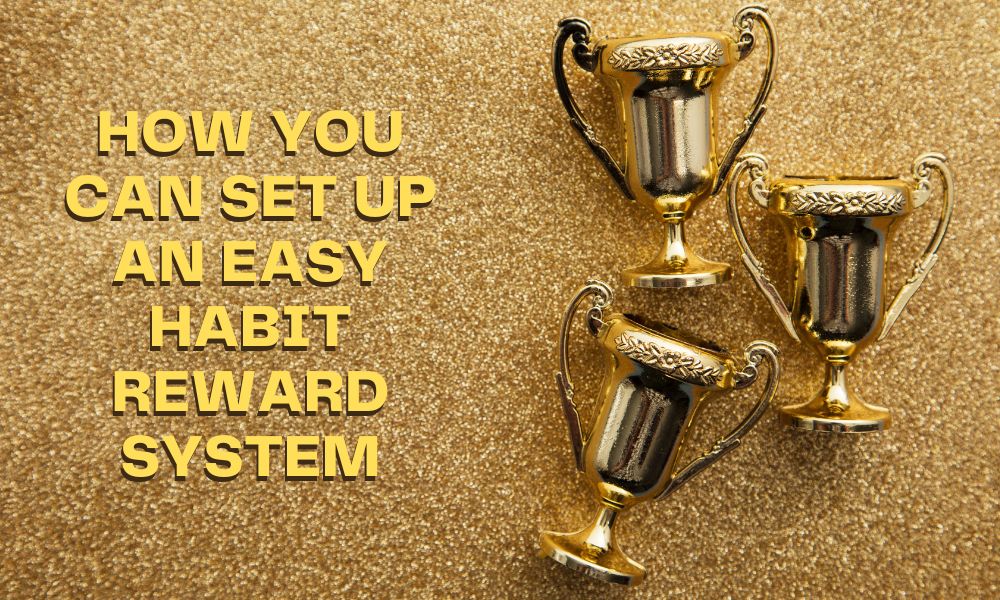
14 Apr Unlock Rewards: How You Can Set Up an Easy Habit Reward System
UNLOCK REWARDS: HOW YOU CAN SET UP AN EASY HABIT REWARD SYSTEM

How Can You Set Up An Easy Habit Reward System?
Habits come and go. But should they be like that? Of course not. A ritual should stick; having external and internal rewards can help you do that.
Developing an easy habit reward system makes habits satisfying. It helps motivate people to form positive habits by providing incentives for desired behaviors. However, these rewards must be appropriate, achievable, consistent, and motivating for the structure to be effective.
Otherwise, behavior change can be difficult. So let’s start with an important rule!
What is the Cardinal Rule of Behavior Change?
Something is likely to be repeated if it’s rewarded.
Do you wish to have more school-life balance? You have probably gone through numerous self-help books about habit development and self-transformation. Moreover, there’s no doubt that they can help you out.
Yet the struggle to achieve behavior change can be remarkable. It doesn’t come down to organization techniques like the Pomodoro to make habits repetitive and enjoyable. They can help you get things done, but the key to having consistent behavior is making it fun and rewarding.
This is where the cardinal rule of behavior change comes in.
Follow a habit with punishment, and it gets avoided.
Follow it with a reward, and it gets repeated.
Keep the above mantra in mind for your good. It’s also necessary to understand intrinsic and extrinsic rewards and motivation. After all, they play a huge role in developing good habits in the long run in the most satisfying manner.
Positive psychology goes a long way in making habits stick. Wondering how it works – learn more about intrinsic and extrinsic rewards below!
Intrinsic Rewards
The inside counts.
When was the last time you bubbled up with joy after accomplishing a task? The positive feelings that follow an achievement are a reward of their own. But what is so special about them if you can’t buy a new backpack or outfit for your school?
The answer is inner satisfaction. Can you relate to any of the scenarios below?
- Completing a challenging task and feeling new strengths and skills
- Confident feelings after passing a subject that you find difficult
- Feelings of progress as you get your very first internship or paid gig
This type of reward is entirely self-directed. Thus, it is more likely to make you consistent when nobody else recognizes your efforts. It also helps you achieve focus and clarity because your motivation comes from within.

Extrinsic Rewards
When someone rewards you for a job well done.
Extrinsic rewards are things we receive in exchange for doing something. These rewards can be tangible, like money or physical gifts. They could also be intangible, like getting promotions at work.
Can you relate to any of the following external rewards?
- Getting extra points for an extracurricular activity
- Getting recognized for winning a match
- Winning $200 in a short story contest
- Becoming the class president or representative
The purpose is to push you out of your comfort zone. Note that these types of rewards are alright. The trick is to use them as inspiration and a ‘push.’ It is important to realize that even external incentives can produce positive feelings, but it’s best not to depend on them.
For example, don’t feel like you are a bad student if you score lower on a test than before. You might not get that reward or medal again but acknowledge yourself for giving your best. Self-awareness and confidence are key to making the external reward system work.
How to Link Internal and External Rewards with Your Identity?
Balancing internal and external rewards is the key to making habits satisfying.
The power of habit is undeniable. Our practices shape our lives and determine our future. They can make or break us, so shaping them around our identity is important.
Habits are deeply ingrained patterns of behavior. A lot of us do them without even thinking. So aligning our habits and what we want to achieve can create positive life changes.
- Assess your personality and what you want to achieve
- Your favorite subjects at school can help you uncover your strengths
- Also, the things that are your least favorite can help you understand your weaknesses
Base your goals on your strengths and weaknesses. Also, remember that there’s more to your personality than your academic life. Set up rewards that you will personally enjoy rather than following the crowd.
So if you are a fan of video games, schedule a time to play every time you end a study session. You can even reward yourself for a bigger and harder task by buying a new video game. Either way, you’ll get an intrinsic motivation, and the purchase even gives you an extrinsic reward.
How to Make the Ending of a Habit Satisfying?
Make it a habit to end the task; all will be well.
What if there is no external or internal motivation to go around? Deal with the setbacks by owning your habits as much as you can. You can set a balanced award system by analyzing your personality.
We have a couple of reminders for you every time you face a setback.
- Identify the purpose: Why are you doing the task at hand?
- Visualize the benefits: Can you see yourself getting better and growing more as a person?
- Make it easy: Have specific and measurable objectives.
- Track your progress: Having a habit tracker or ‘mini’ rewards can be satisfying.
It does not have to be perfect. You need to complete it to get things done on time and productively. Keep the intent in mind and celebrate small wins, which can boost your intrinsic motivation in the long run.

Takeaway: Never Lose Your Pace
Having intent around your identity is important to keep the habit going.
Developing a new habit can be a challenging task. Turning it into a routine takes more time, effort, and patience. Having strong and clear intent can help you focus on your goals.
Remember your identity, as you can assess your strengths and weaknesses with that. Set up a reward system that works entirely for you and be as independent as possible from external factors. It’s key for keeping your mental health in check and balancing school with your lifestyle.
People are more likely to adopt new habits when they’re easy. Learn to turn them into a routine by priming your environment for success!
Check Our Our Other Blogs:
Craig Selinger
Latest posts by Craig Selinger (see all)
- Psychotherapy and Support Services at Cope With School NYC - April 12, 2024
- NYC Parents of Teens Support Group - April 8, 2024
- Here I Am, I Am Me: An Illustrated Guide to Mental Health - April 4, 2024


No Comments